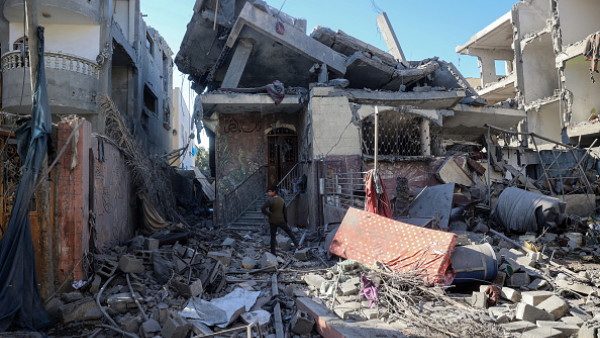At least 50 people were killed after Israel struck a residential building in Beit Lahia [Getty]
Israeli strikes killed dozens of people in Gaza Sunday, civil defence rescuers said, most of them in northern Gaza where the UN and others have decried disastrous humanitarian conditions.
In Lebanon, Israeli strikes killed 11 people in the south and six in Beirut — including Hezbollah spokesman Mohammed Afif.
On Sunday, Gaza’s civil defence agency said at least 50 people were massacred, including children, and dozens were missing after an Israeli air strike hit a five-storey residential building in Beit Lahia.
“The chances of rescuing more wounded are decreasing because of the continuous shooting and artillery shelling,” civil defence spokesman Mahmud Bassal told AFP.
Weighed down with backpacks, many like Omar Abdel Aaal were fleeing, often on foot, through dusty streets.
“They bombarded the houses and completely destroyed Beit Lahia,” he said.
Israel’s military said there were “ongoing terrorist activities in the area of Beit Lahia” and several strikes were directed at militant targets there.
“We emphasise that there have been continuous efforts to evacuate the civilian population from the active war zone in the area,” the military said in a statement.It separately announced the death of two soldiers during combat in north Gaza.
In other deadly strikes, Bassal said attacks killed 15 people in central Gaza and five in the southern city of Rafah.
Also in the south, in the Khan Younis area, civil defence said an Israeli drone targeted a group of unarmed people securing an aid delivery, killing six.
The health ministry in Gaza on Sunday said the overall death toll in more than 13 months of war had reached at least 43,846.
The majority of the dead are civilians, according to ministry data which the United Nations consider reliable.
Nasrallah confidant killed
An Israeli strike in central Beirut on Sunday killed Hezbollah spokesman Mohammed Afif, Israel’s military and the group said.
Four people were killed in the strike, one of relatively few attacks outside the group’s strongholds which include southern Beirut.
Previous strikes claimed by Israel have killed senior Hezbollah officials including its leader Hassan Nasrallah in late September. Afif was part of Nasrallah’s inner circle.
Late Sunday, Lebanon’s health ministry said another Israeli strike in central Beirut killed two people and wounded 22. Firefighters were battling a blaze triggered by the strike in the commercial-residential area.
The education minister later announced Beirut-area schools would close for two days.
Israel’s military told AFP it had hit more than 200 targets in Lebanon over 36 hours, including in Beirut’s southern suburbs on multiple occasions.
In comparison, the military announced on October 21 that it hit about 300 Hezbollah targets in a 24-hour period, and on October 7 said the number of targets struck in south Lebanon exceeded 120 in just one hour.
Lebanon’s military, which is not a party to the conflict, said Israel “directly targeted” an army centre in south Lebanon Sunday, killing two soldiers.
Israel’s military said about 20 projectiles crossed from Lebanon into Israel, and some were intercepted.
The United Nations force in south Lebanon said peacekeepers were fired upon around 40 times on Saturday, probably by “non-state actor” individuals who tried to prevent a patrol from passing. No injuries were reported.
‘Unfit’ for survival
Several Israeli strikes in recent weeks on Baalbek in east Lebanon and Tyre in the south — both Hezbollah strongholds — hit close to ancient Roman ruins designated as UNESCO World Heritage sites.
Archaeologists and academics were among 300 prominent cultural figures who signed a petition, published Sunday, calling on the United Nations to safeguard Lebanon’s heritage and establish “no-target zones”.
Israeli strikes in the Tyre region killed 11 people and wounded 48 on Sunday, the Lebanese health ministry said.
Lebanese authorities say more than 3,480 people have been killed since October last year, with most casualties recorded since September.
Jordan and Qatar urged “immediate” action to “end the unprecedented humanitarian disaster in northern Gaza”, their foreign ministers said in a joint statement Sunday, blaming “Israel’s failure to allow aid to enter”.
The United States, Israel’s top military supplier, last week said Israel was not violating US law on the level of aid entering Gaza but called for further progress.
Joyce Msuya, interim chief of the UN humanitarian agency (OCHA), put it more starkly in an address to the UN Security Council.
“The daily cruelty we see in Gaza seems to have no limits,” she said Tuesday. “Conditions of life across Gaza are unfit for human survival.”

